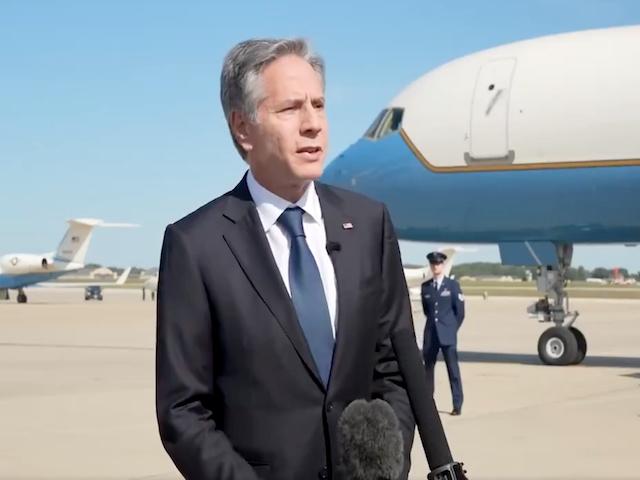On Monday, U.S. Secretary of State Antony Blinken embarked on his ninth diplomatic mission to the Middle East since the fateful day of October 7th, when Hamas unleashed a devastating cross-border assault on Israel, igniting the ongoing conflict that has since gripped the region. Blinken’s latest journey commenced in Israel, a nation still reeling from the brutal attacks, where he secured a pivotal agreement from the Israeli government on a U.S.-proposed "bridging proposal" aimed at ceasing the hostilities between Israel and Hamas. This proposal represents a delicate compromise, forged from the differing responses of Israel and Hamas to initial U.S. peace efforts first introduced in May.
However, unlike Israel, which has agreed to engage with the proposal, Hamas has stubbornly refused to participate in the talks. Instead, Egypt and Qatar have taken on the role of mediators, attempting to represent Hamas’s interests in this complex diplomatic dance. On Tuesday, Blinken is scheduled to visit these key players—Egypt and Qatar—in the hopes that their influence might sway the Hamas leadership to embrace the U.S. initiative.
Despite the mounting toll of the conflict, with Hamas's own estimates indicating that approximately 40,000 Palestinians have perished in the ten months since the war began, the organization has remained obstinate. Logic would dictate that such staggering losses should prompt Hamas to seek an immediate end to the bloodshed, yet this has not been the case. This stark reality was a focal point in Blinken’s discussions with reporters following his high-stakes meetings in Israel, where he did not mince words in questioning the motives and decision-making of Hamas's leadership.
US Secretary of State Antony Blinken said Israel has accepted the US’s ‘bridge proposal’ for ceasefire, with the two sides now waiting to hear Hamas’s response. pic.twitter.com/hwLtOQycMo
— The National (@TheNationalNews) August 20, 2024
Blinken’s High-Stakes Meetings in Israel
During his visit to Israel, Blinken engaged in intense discussions with the country’s top political and military figures, including President Isaac Herzog, Prime Minister Benjamin Netanyahu, Defense Minister Yoav Gallant, and IDF Chief of Staff Herzi Halevi. The centerpiece of these meetings was Blinken’s nearly three-hour-long conversation with Netanyahu, a session described as “very constructive” by the Secretary of State.
In a post-meeting press briefing, Blinken revealed that Netanyahu had unequivocally endorsed the U.S. bridging proposal. “Netanyahu confirmed to me that Israel accepts the bridging proposal, that he supports it,” Blinken stated, emphasizing that the ball is now firmly in Hamas’s court. “It’s now incumbent on Hamas to do the same,” he asserted, with a tone of urgency and resolve.
The Burning Question: Does Hamas Truly Care About Palestinian Lives?
Blinken did not shy away from posing the critical question of the day—whether Hamas, which claims to represent the Palestinian people, actually prioritizes their well-being. “If Hamas genuinely cares about the Palestinian people that it purports to somehow represent, then it will say yes to this agreement and it will work on clear understandings about how to implement it,” Blinken declared, leaving no room for ambiguity.
He continued, “The single, quickest, best, most effective way to relieve the suffering of the Palestinians, suffering that was instigated by Hamas’s attack on October 7th and the war that ensued, is to complete this agreement.” His words laid bare the stark choice facing Hamas: continue the path of destruction or choose a way forward that could alleviate the immense human suffering that their actions have caused.
Israel Accepts Proposal to Bridge Differences on Cease-Fire, Blinken Says
— Breaking News (@FastNews77) August 20, 2024
The statement by the Secretary of State put new pressure on Hamas, whose officials have called the proposal fundamentally slanted toward Israel.#news #worldnews #media #breakingnews pic.twitter.com/EtFFsSXdww
“So that’s really the question,” Blinken pressed on, “Is Hamas, is its leadership actually looking out for Palestinian children, women, and men who are suffering at this very moment in Israel?” The gravity of his question lingered in the air, a challenge to Hamas's moral and political authority.
The Diplomatic Marathon Continues
As Blinken moves on to the next phase of his mission, all eyes will be on the meetings in Egypt and Qatar, where the fate of the U.S. proposal may be determined. In Egypt, Blinken is set to confer with President Abdul Fattah El-Sisi, Foreign Minister Badr Abdelatty, and intelligence chief Abbas Kamel. These discussions will take place in the coastal town of Al Alamein, a symbol of Egypt’s modernization efforts under Sisi’s government, far removed from the political tensions of Cairo.
Subsequently, Blinken will travel to Qatar, where he is scheduled to meet with the Amir, Sheikh Tamim bin Hamad Al Thani. The hope is that these pivotal meetings will yield progress in persuading Hamas to reconsider its stance and accept the U.S. proposal, thereby opening the door to a desperately needed ceasefire.
After holding talks in Israel and securing a commitment from Netanyahu to a “bridging proposal” Blinken is departing for talks in both Egypt and Qatar to press Hamas, through intermediaries, to continues talks and work towards reaching a ceasefire deal pic.twitter.com/H9BWcb8kJ1
— Robert Jimison (@RobertJimison) August 20, 2024
As the diplomatic marathon continues, the world watches and waits, hoping for a breakthrough that could bring an end to one of the most tragic and destructive conflicts of our time.


